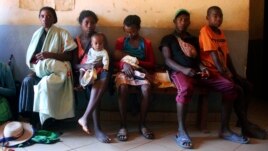22 April, 2019
Measles is only found in human beings. There is a highly effective and safe vaccine for the disease. So, in theory, measles could be destroyed.
Yet the number of measles cases is on the rise.
The World Health Organization (WHO) reports that, in the first three months of 2019, the number of cases is three times higher than it was last year.

In this photo taken Thursday, March 21, 2019, mothers wait to have their babies vaccinated against measles, at a healthcare center in Larintsena, Madagascar. (AP Photo/Laetitia Bezain)
Africa alone has had a 700-percent increase compared to last year.
The Democratic Republic of Congo reported 67,000 measles cases and 901 measles-related deaths in 2018. This year, WHO officials have noted more than 16,000 suspected measles cases in the country. That number includes 284 measles-related deaths in the first weeks of 2019.
Between September 2018 and February 2019, Madagascar reported over 67,000 measles cases, including 828 deaths.
Dr. Anthony Fauci directs the National Institute of Allergy and Infectious Disease, part of the United States government's National Institutes of Health. He says the measles situation in Madagascar is extremely serious.
"Madagascar has almost 1,000 deaths and has tens of thousands of infections," Fauci said.
The National Institutes of Health warns that a decrease in measles vaccination is causing a preventable return of this often deadly disease worldwide.
Fauci told VOA that "one in 10 children who get infected with measles will get an ear infection that could cause deafness. One in 20 would get pneumonia. One in a thousand would get brain swelling, what we call encephalitis, and one to three per thousand would die. To say that measles is a trivial disease is completely incorrect."
Walter Orenstein is with the Emory University Vaccine Center in Atlanta, Georgia. He has spent his life working to end measles. Orenstein says possible effects of the disease are worse in poor countries.
"You start off with children who are already at greater risk. They may be malnourished. They may have compromised immune systems. They may be underweight and may have no access to health care so measles is a big killer," he said.
You have a 90 percent chance of getting measles if you have not been vaccinated and you come in contact with someone who has it. Dr. Rebecca Martin is the Director of the Center for Global Health at the U.S. Centers for Disease Control. She is working to remove measles from Africa completely.
"It is very infectious. It will find everybody who is not protected against measles," Martin said.
Health experts advise patients to get two treatments of the measles vaccine. U.S. health officials say educating parents about both the disease and the vaccine is an important step in stopping the spread.
Equally important is making vaccination a top goal of health systems worldwide.
I'm Caty Weaver.
VOA correspondent Carol Pearson reported this story. Caty Weaver adapted it for Learning English. George Grow was the editor.
_____________________________________________________________
Words in this Story
trivial - adj. not important
malnourished - adj. not eating enough food or not eating enough healthy food
immune system - n. the system that protects your body from diseases and infections
access - n. a way of being able to use or get something
pneumonia - n. a serious disease that affects the lungs and makes it difficult to breathe
swell - v. to become larger than normal